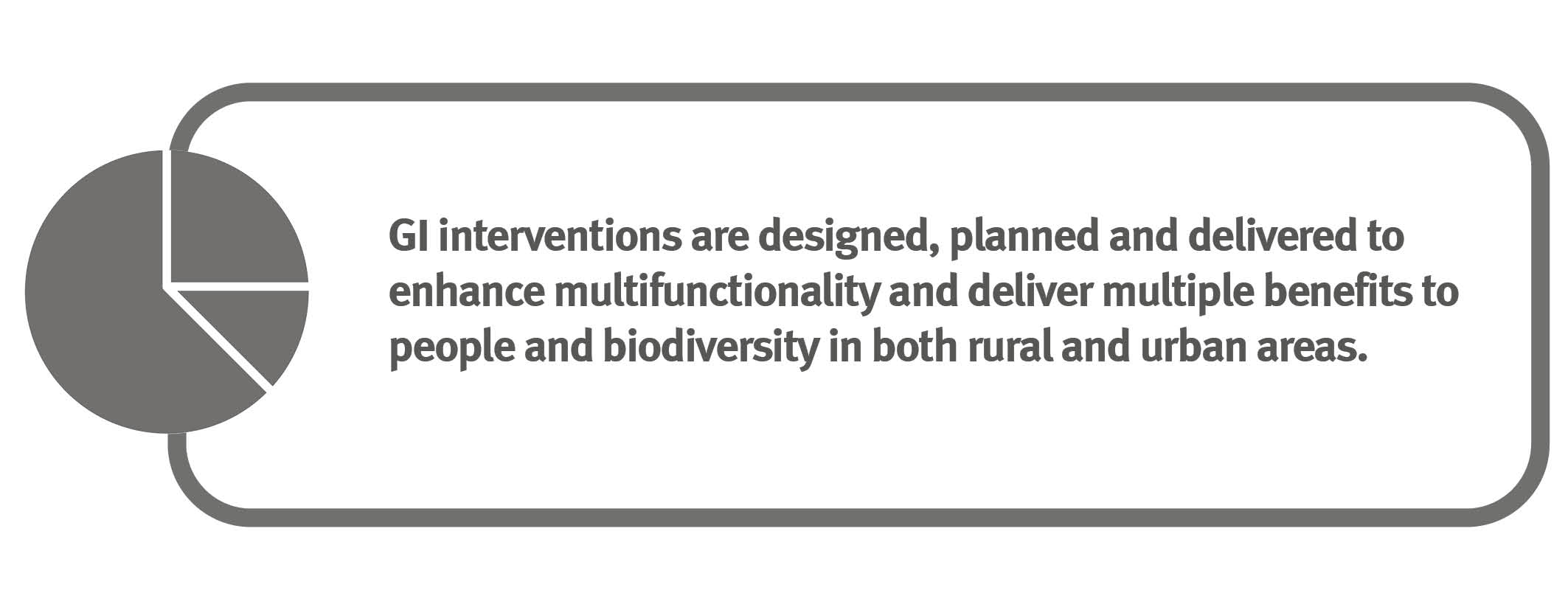Principle 3: Multifunctional Outcomes
Standard
Why does it matter?
All too often plans, and projects are designed and delivered to address one identified problem despite potential opportunities to deliver multiple benefits and therefore help solve different challenges.
A healthy environment is a network that provides multiple benefits to people such as health and wellbeing, cleaner air, active travel and local food production.
A well-planned and managed GI strategy can help Essex meet and respond to key challenges faced in the community.
Meeting the principle
The delivery of multifunctional GI must be considered in development proposals and projects. Below is some of the key points that should be considered for policy documents and development proposals: -
Enhancing biodiversity/environmental net gains - Biodiverse environments provide multiple benefits. Mandatory Biodiversity Net Gain will be implemented through the planning system. Furthermore, there is an opportunity within strategic planning and development management to capture wider environmental gains that deliver multiple benefits that impact on economic and social health and wellbeing.
Improve local area identity and character – Good planning requires creating a strong identity for an area and GI is a critical component. The improvement of GI helps to enhance the character, quality and create an identity for an area. It gives people a role in public space, enhancing a sense of ownership and pride. Street trees provide shade for buildings and people, flood and water management and stepping stone/ green corridor for wildlife. It is important GI policies are reflective of the existing character of the place.
Providing recreation for all ages and abilities - GI provision should improve equality allowing all residents access to quality green space. Often it is economically disadvantaged communities that have poorer health and educational outcomes. These communities also have the lowest levels of access to nature.
Improving Health and wellbeing - Access to nature-rich environments and green space has a positive impact on health and wellbeing. GI can help tackle the obesity and inactivity crisis and thereby preventing many illnesses including cancer, heart attacks and strokes (these are the 3 biggest killers in the UK).
Integration of flood and water management as part of green space, highways and other provision - Flooding remains one of the most frequent natural hazards in Essex and is predicted to experience an increase in flooding, extreme weather events and summer droughts through climate change. GI provides significant opportunities to deliver space for water and natural options for flood alleviation and water management. Development should include biodiversity and open space provision, which will provide aesthetic and amenity value, and safe public access as well as managing flood risk. The importance of this is highlighted within the Essex SuDS Design Guide.
Climate change adaptation and mitigation – Majority of the Essex LPAs have declared climate emergency or climate action and have made a commitment to meet government targets, moving towards net-zero, including the commitment and ambitious targets set by ECAC outlining how Essex can improve the natural and built environment and the economy through tackling climate change. Policies will need to strengthen their position to meet these targets. As the climate changes, the UK needs to plan for more extreme weather events. Practitioners should design, implement and manage GI to provide natural solutions to climate challenges. Here nature recovery networks and improved connectivity become key to help wildlife move and adapt. GI also reduces urban heat by cooling the air.
Improving Air Quality - GI also cleans the air we breathe by filtering particulates. Planting of GI to create attractive environments that will incentivise active travel, such as walking, cycling and horse riding.
Commercial and Industry – High-quality environments with natural green spaces are attractive to people. They attract investment and support businesses.
Education - GI provides learning opportunities as an ‘outdoor classroom’. It is a valuable educational resource and has the potential to improve educational achievement, through improved concentration and self-esteem.
Providing local access to food production opportunities (i.e., orchards and allotments) – There is a growing concern around food security and access to orchards and allotments, which can be utilised for food production, whilst providing several therapeutic benefits.
Page updated: 4/04/2023


